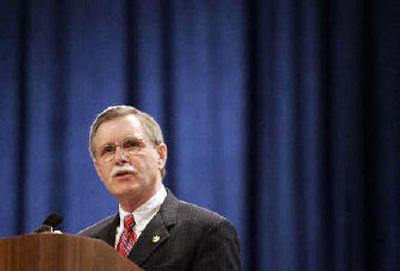UAW chief talking tough

DETROIT — United Auto Workers President Ron Gettelfinger kicked off his union’s bargaining convention Tuesday with a warning for companies: Just because we’ve cooperated in the past, don’t take that as a sign of weakness.
In a speech at the start of the two-day national bargaining convention in downtown Detroit, Gettelfinger said the union will fight companies at the bargaining table, in politics and “if need be on the picket line.”
Addressing 1,500 members from multiple industries who will help set the union’s overall bargaining priorities, a defiant Gettelfinger said the union does not want to strike, but will if necessary.
“We will do what we have to do,” he said. “Make no mistake about it. Collective bargaining is not collective begging.”
The convention delegates, from more than 800 UAW locals in the U.S. and Canada, weren’t expected to get into the nitty-gritty of what will be discussed with individual companies.
Still, crucial contract talks with the Detroit Three automakers loom. They begin officially this summer, although meetings already have started. The national UAW contract with automakers expires in September.
In his speech, Gettelfinger acknowledged that the UAW has faced continued challenges since its last bargaining convention in 2002, citing DaimlerChrysler AG’s February announcement that it would consider selling its U.S.-based Chrysler unit.
“We have equity and hedge funds circling our head as never before,” he said of potential buyers for Chrysler.
Gettelfinger accused the funds of “stripping and flipping” companies they buy.
“Our union is on guard to protect the best interests of our membership,” he said.
But it was concessions of the past, and potentially of the future, that rankled some union members. Outside the convention center where Gettelfinger spoke, about 20 members and retirees carried signs in protest.
One delegate, Mike Parker, a worker at Chrysler’s Sterling Heights assembly plant, made a motion to change today’s agenda to set aside time for organizing local leaders to fight back against companies that are demanding concessions plant by plant.
“The problem is the locals are being left to bargain by themselves in dealing with the companies,” he said in an interview.
The motion was shot down by a voice vote, but others made similar speeches about zero concessions and bringing an end to a two-tier wage scale in which new hires are paid far less than older workers.